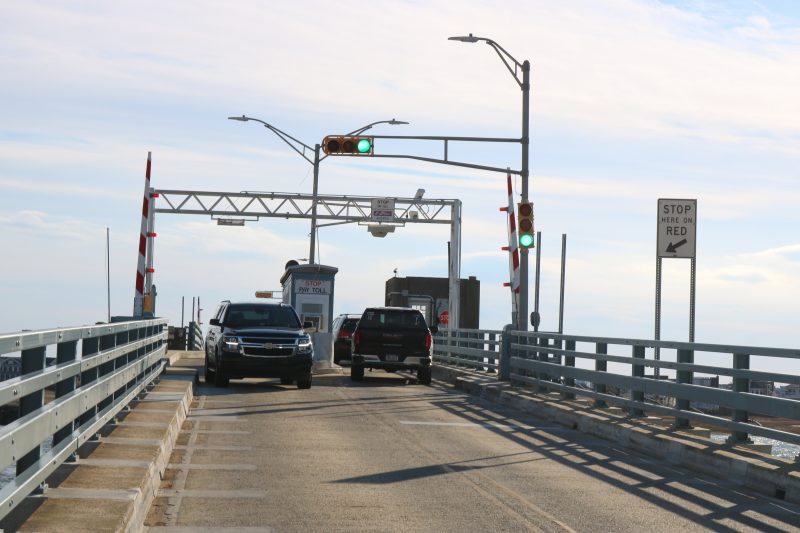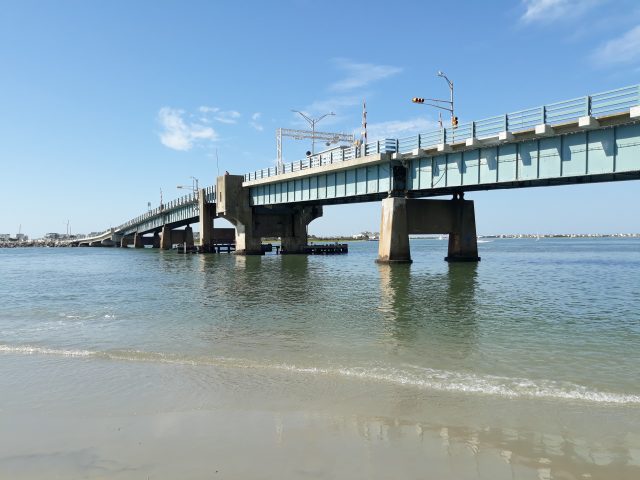By DONALD WITTKOWSKI
The Cape May County Bridge Commission is planning a three-stage toll increase that would raise the fare by a total of $1.50 on the five coastal bridges it operates.
According to a summary of the plan released by the agency Tuesday, the toll would increase by 50 cents in 2022, 50 cents in 2023 and 50 cents in 2024.
The current toll of $1.50 for cars would double to $3 once the increase is fully implemented by 2024.
Toll rates for trucks would also go up by 50 cents per year under the proposal. Depending on the number of axles they have and whether they are pulling a trailer, trucks currently pay tolls ranging from $2.75 to $12.75. Under the toll hike, the truck rates would range from $4.25 to $14.25 when the full increase is implemented by 2024, the summary shows.
The Bridge Commission operates five toll bridges linking the Cape May County shore communities along the scenic Ocean Drive. They include the Ocean City-Longport Bridge, Townsends Inlet Bridge, Corsons Inlet Bridge, Middle Thorofare Bridge and Grassy Sound Bridge.
The Townsends Inlet, Corsons Inlet, Middle Thorofare and Grassy Sound bridges were built in the 1930s and are often in need of maintenance or repair projects to keep them in operation.
“We are unusual to have these four very old, movable bridges,” said Karen Coughlin, the Bridge Commission’s executive director. “Not too many areas have four (bridges) that are well past their age. They were all built in the 1930s and all done by 1940. It is amazing that they lasted all this time. We want to replace them in the future, but for now, we need to make them last.”
Ocean City-Longport, which opened in 2002, is the only modern bridge in the Bridge Commission’s network.
Higher tolls would generate extra revenue to help the commission pay for bridge maintenance and smaller repair projects, the agency says. Currently, the commission depends on Cape May County to pay for all maintenance, repairs and upgrades to the bridges.
The toll hike would give the commission its own funding to help pay for those projects, according to a statement explaining the reason for the proposed increase.
“The Cape May County Bridge Commission is considering a 3-stage toll adjustment to comply with bond policy to ensure payment of financial obligations and provide funding for future maintenance projects,” the statement says.

Before the toll increase could happen, the Bridge Commission’s board members would need to make a decision after reviewing the proposal, including public comments, at a meeting on Jan. 20. At that time, the commission would vote on whether to pass a resolution formally approving the toll increase, Coughlin said.
A public comment period on the proposed toll increase will start on Dec. 8 and end on Jan. 8. Members of the public will be able to fill out comment forms at all of the toll booths on the bridges or may email or mail them to the commission. More details are available at https://capemaycountynj.gov/1541/2022-2024-Toll-Adjustment.
MediaWize, publisher of the OCNJDaily.com, SeaIsleNews.com, SomersPoint.com and Downbeach.com websites, exclusively reported on Dec. 1 that the commission was proposing to increase tolls by 50 cents in 2022. The newly released summary shows that the toll hike would be more extensive, also including 50 cents per year in 2023 and 2024.
The Bridge Commission’s projected toll revenue for 2021 is $3 million. Currently, the commission uses its revenue for administrative expenses, payments to its vendors and to maintain a surplus.
With the toll increases, revenue is projected to increase to $4.2 million in 2022, $5.1 million in 2023 and $6.1 million in 2024. Of that revenue, $550,000 would go toward bridge projects in 2022, $1.5 million in 2023 and $2.5 million in 2024, the summary shows.
Raising the tolls to generate extra revenue for bridge projects is something the commission has considered in recent years. The agency discussed the possibility of raising tolls last year, but decided against it because of the coronavirus pandemic, Coughlin said. The last toll increase was in 2009.
The commission originally announced plans for a fare hike in 2017 to help pay for the introduction of the E-ZPass automated toll collection system on the bridges.
It later backed off raising tolls in 2017, after deciding that a fare increase during the summer tourism rush would have been complicated and confusing for motorists.
Under the proposed 2017 toll hike, the commission had wanted to structure it in a way so that year-round residents would not carry the burden of the increase.
There would have been a $1 increase in effect from Memorial Day to Columbus Day to coincide with the summer tourism season. A 50-cent toll increase would have occurred during the off-season.








